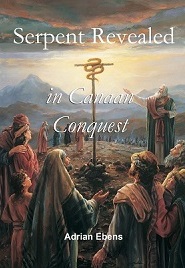He Came out of the Father
A previous article, "Coming Out From the Father," discussed Ellen White's usage of the texts which reference Christ's declaration that he came out of the Father:
| John 8:42 John 13:3 John 16:27 John 16:28 John 16:30 John 17:8 |
Jesus proceeded forth from God (ek tou thenou ex?lthon) Jesus had come forth from God (apo theou ex?lthen) Jesus came out from God (ego para tou theou ex?lthon) Jesus came forth from the Father (ex?lthon ek tou patros) that you came forth from God Iapo theou ex?lthes) Jesus came out from the Father (para sou ex?lthon) |
There are a number of additional authors of the 19th century contemporaneous with Ellen White who discussed these texts. It is of interest to note how they apply them. In The Church of England magazine, Vol. 20 of 1846, p. 126, contained an article entitled, “Remarks on Portions of the Nicene Creed.”
“God of (or from) God” (theon ek theiou). In John xx. 28; Rom. ix. 3, &c., the Redeemer is expressly styled God; and he himself declared, “For I proceeded forth, and came from God” (ego gar ek tou theou exelthon kai eko—John viii. 42). “Light of (or from) Light” (phos ek photos). Jesus said, “I am the light of the world” (John viii. 12): “I proceeded forth, and came from God” (ek tou theou—John viii. 42): “God is light” (1 John i. 5). “Very (i.e., true) God of (or from) very God” (theon alethenon ek theou alethenou.” In John xvii. 3, Jesus says: “And this is life eternal, that they might know thee, the only true God” (ton monon alethenon theon), “and Jesus Christ, whom thou hast sent:” in Col. ii. 9: “In him dwelleth all the fullness of the Godhead bodily:” “I proceeded forth, and came from God” (John viii. 42); and in 1 John v. 20, we read, “And we are in him that is true, even in his Son Jesus Christ. This (or he) is the true God, and eternal life” (autos estin ho alethenos theos, kai he zwn ainos): “Begotten” (Ps. ii. 7*; John i. 18; vi. 46; x. 15), “not made;” for he says, “before Abraham was, I am” (ego ema—John viii. 58): see also John i. 1, 2; Rev. i. 8; xxi. 6; xxii. 8.
The article appeals to the very verses under consideration as support for the Nicene Creed’s wording regarding the divinely begotten Son who “proceeded forth, and came from God.” Three times John 8:42 is cited—not in defense of the incarnation, but of the Son’s pre-existence and divine origin. The article comments, “we declare that he is God the Son from God the Father, truly and verily God, as we conceive the Father to be; and the addition of ‘Light from Light’ was intended to exemplify a communication of the divine attributes, without detracting any thing from the prerogative of the Father.” [emphasis added]
Lectures on Unitarianism, more especially as taught by J. Barker by Samuel Minton was published in 1847. The title is a bit misleading, as Minton in fact opposes Unitarianism. Part of his argument includes a discussion of John 17:8 as illustrated here in Lecture XI, The Pre-Existence of Christ, on p. 141:
John xvii. 8. “And they have received them; and have known surely that I came out from thee, and they have believed that thou dist send me.” The Apostles are here said to believe two things; 1st, that Jesus “came out from” God; and 2ndly, that he was sent by God.
Minton, as well as other commentators to follow, observed that Christ’s expression consists of two phrases that address two phases. His intention is to draw attention to the divine origin of Christ. He then states,
What can induce any one to resist such positive declarations as these, I am at a loss to conceive: unless it be a determination to degrade the person of the Saviour to the lowest possible point….Indeed the great bulk of those who denied our Lord’s Deity in the first seventeen centuries, always contended that he had a pre-existence as the Son of God, though not as God. But the tendency of error is to sink lower and lower; and few in the present day are satisfied with Arianism.
This was the force of the wording employed by the framers of the Nicene Creed against Arius. They were champions of the “begotten not created” Son of God. They took the position that the Son was begotten “of the same substance as the Father” to counter the Arian position that the Son was created and did not exist before he was created.
The Ante-Nicene Fathers, Vol. 3 by Donaldson, Coxe, Richardson, Pick, Menzies published in 1887. Chapter VIII includes a translation of Tertullian’s Against Praxeas. On page 602 the Roman apologist comments on Christ’s expression in the context of Proverbs 8.
The Son likewise acknowledges the Father, speaking in His own person, under the name of Wisdom: “The Lord formed Me as the beginning of His ways (Prov 8:22), with a view to His own works; before all the hills did He beget Me.”…”By His word were the heavens established, and all the powers thereof by His Spirit” (Ps 33:6)—that is to say, by the Spirit (or Divine Nature) which was in the Word: thus is it evident that it is one and the same power which is in one place described under the name of Wisdom, and in another passage under the appellation of the Word, which was initiated for the works of God, which “strengthened the heavens;” “by which all things were made,” (John 1:3; 1Cor 8:6) “and without which nothing was made.” Nor need we dwell any longer on this point, as if it were not the very Word Himself, who is spoken of under the name both of Wisdom and of Reason, and of the entire Divine Soul and Spirit. He became also the Son of God, and was begotten when He proceeded forth from Him. (John 8:42)
In the same work, volume 5, is a translation of Novatian’s Treatise Concerning the Trinity. Chapter XV, on p. 624 addresses John 8:42.
If Christ is man only, how does He say, “I proceeded forth and came from God,” when it is evident that man was made by God, and did not proceed forth from Him? But in the way in which as man He proceeded not from God, thus the Word of God proceeded, of whom it is said, “My heart hath uttered forth a good Word;” [Ps xlv. 1] which, because it is from God, is with reason also with God. And this, too, since it was not uttered without effect, reasonably makes all things: “For all things were made by Him, and without Him was nothing made.” But this Word whereby all things were made (is God). “And God,” says he, “was the Word.” Therefore God proceeded from God, in that the Word which proceeded is God, who proceeded forth from God.
Another treatment of this verse is found in Alvah Hovey’s Commentary on the Gospel of John published in 1885. This is particularly interesting in that both Hovey and Ellen White use the same “in the highest sense” expression.
If God were your Father, ye would love me. [bold in original] Those who are truly children of God, loving him supremely, must love the Son of God; by him the character of the Father is fully revealed. If what Jesus had so often affirmed in these colloquies was true—if his teaching and his working were also the teaching and the working of the Father—it was of course, strictly impossible for them to have a filial spirit towards God without loving him who was, in the highest sense, the Son of God—the brightness of the Father’s glory, and the express image of his person. (Heb. 1:3.) For I proceeded forth and came from (or, out of, ek) God.
In the Desire of Ages this episode was the reason that the Jewish leaders accused Christ of blasphemy.
“The whole nation of the Jews called God their Father, therefore they would not have been so enraged if Christ had represented Himself as standing in the same relation to God. But they accused Him of blasphemy, showing that they understood Him as making this claim in the highest sense.” DA p. 207 1898
In claiming God as his Father, Christ stated that God was his Father “in the highest sense.” This was a different sense in which the Jews called God “their Father.” Their sense was that of a spiritual Father; but Christ claimed that God was his Father in a much higher sense—in the highest sense—that of a physical Father, a real, literal Father. In 1901 Ellen White was even more definite.
“The whole nation called God their Father, and if Jesus had done this in the same sense in which they did, the Pharisees would not have been so enraged. But they accused Jesus of blasphemy, showing that they understood that Christ claimed God as His Father in the very highest sense.” (Ellen G. White, Review and Herald, March 5, 1901, ‘Lessons from the Christ-life’)
The very highest sense of Father is a literal Father who was the source of his life. “For as the Father has life in Himself, so has He given that the Son should have life in himself” John 5:26. It was his Father in heaven from Whom he came out (John 8:42; 16:27,28; 17:8).
Christ, according to Hovey, was the Son of God “in the highest sense”; Christ claimed “God as his Father in the highest sense”—“in the very highest sense”—according to Ellen White. Hovey continues:
The pronoun I is emphatic; and the expression proceeded, or, came forth from God, presupposes an original and perfect union with the Father, while it asserts a voluntary personal entrance into a new condition, effected by the incarnation.
The second verb, came, or, am come, represents his advent as already accomplished, so that he is now present among men to declare the will of God. Neither came I of myself, but he sent me. He has come by the will of the Father, and not by any act of his own will, irrespective of, or separate from, the will of the Father. Father and Son have the same object, the same purpose, the same spirit, the same message.
Hovey follows the same logic as the Nicene Creed. The Son’s true divinity is based on his original, perfect union with his Father. Hovey also notes that there are two verbs indicating two separate actions. On page 329 he takes on John 16:28.
I came forth from the Father. More precisely, I came out from the Father; not from the Father’s side (para), but as it were, out from (ek) the inner being, the very life and love of the Father. The language is exact, and strong enough to be appealed to in proof of the essential unity of the Father and the Son, or at least of the Father and the Word. But it does not suggest the doctrine of eternal generation; for the coming out from the inner sphere of the Father’s life, is represented as an act of Christ (not of the Father), performed at a definite moment in the past.
Brooke Foss Wescott wrote “The Gospel according to St. John: the authorized version” in 1882. His additional comments on John 8:42 are found on p. 136. He also points to the two verbs: came and come.
The Person and the Work of the Lord were both evidences of His Sonship. This He shews by placing His mission first in relation to His divine nature, and then in relation to its historic aspect. In the first clause the two points, the actual mission (I came forth, ex?lthon), and the present fulfillment of the mission (I am come, heko), are contemplated in their distinctness.
The first point addresses the Son’s divine nature: he came forth from his divine Father. The second describes the historic aspect of his incarnation: he is come into the world.
proceeded forth and came…] came forth from (i.e. out of) God and am come… The first phrase (ek tou theou exelthon, Vulg. ex deo procesis) is most remarkable, and occurs only in one other place, xvi. 28, where the preposition has been variously disturbed, some copies reading from the side of (para), and others away from (apo), but here there is no variation. The words can only be interpreted of the true divinity of the Son, of which the Father is the source and fountain.
The first phrase is most remarkable because it is accentuated by the addition of the preposition ek which makes explicit what exelthon implies: that the Father is the Source and Fountain of the Son’s true divinity.
The connexion described is internal and essential, and not that of presence or external fellowship. In this respect the phrase must be distinguished from “came forth from” (exelthein apo) used of the separation involved in the Incarnation under one aspect (xiii. 3, xvi. 30); and also from “came forth from the side of” (exelthein para), which emphasizes the personal fellowship of the Father and the Son (xvi. 27, xvii. 8). These differences of thought are clearly seen in xvi. 27, 28, 30.
Wescott contrasts the usage of ek tou theou exelthon in John 8:42 “out of-the God I came” which he regards as internal and essential with exelthein apo in John 13:3; 16:30 “came forth from” which he classifies as an indication that the Son was merely leaving the presence of his Father and is further distinguished from the use of exelthein para in John 16:27; 17:8 which emphasizes an initial position of close intimacy before the Son “came forth from the side of” his Father.
This does not appear to agree with the available manuscripts on the John 17:8 references.
KATA IOANNHN 17:8 according to the base text of the Stephanus Textus Receptus (1550), Wescott/Hort edition of the Greek New Testament (1881), Tischendorf’s 8th Edition (available at http://morphgnt.org), Textus Receptus (1894 edition), and the Byzantine/Majority Text edited by Maurice A. Robinson and William G. Pierpont, (2000 edition), the phrase is παρ? σο? ?ξ?λθον. The same sources record the phrase παρ? το? Θεο? ?ξ?λθον for John 16:27.
John 16:30 records the disciples’ confirmation of their “clear” understanding of Christ’s words in the previous verses. But here the expression is ?π? θεο? ?ξ?λθες “from God you came forth.” It is the only occurrence of this second person aortist active indicative singular form of the verb derived from ek and erchomai.
A commentary, critical, expository, and practical, on the Gospel of John by John Jason Owen was published in 1860 and commented on John 8:42 as well.
If God were your Father (in the spiritual sense which you claim him to be), ye would love me. Children of the same parent love one another, and this is proportion to the respect and veneration they feel for their father. To this common and well-known principle in the family relation, our Lord appeals to proof of his assertion, that his parentage and theirs were diverse and antagonistic. . . .How then could they claim to be children of that God, who was in the highest and most peculiar sense his Father? For I proceeded forth and came from God. This shows his divine paternity, and establishes his claim to their love, if they were, as they professed to be, the children of God.
Owen also agrees with Hovey and Ellen White in concluding that Christ’s statement was in fact a claim that God was his Father “in the highest and most peculiar sense.” Why? Because he “proceeded forth and came from God” which gives clear evidence of his “divine paternity.”
Ellen White’s clearest exposition of this verse can be found in her Signs of the Times article of 1900.
She is commenting on the episode of John 8 and begins with the issue of sonship and parentage.
“If ye were Abraham's children, ye would do the works of Abraham. But now ye seek to kill Me, a Man that hath told you the truth, which I have heard of God; this did not Abraham."
Christ declares that lineal connection is superseded by spiritual connection.
"If God were your Father," Christ said, "ye would love Me; for I proceeded forth and came from God; neither came I of Myself, but He sent Me. Why do ye not understand My speech? even because ye can not hear My word." Signs of the Times, Aug 29, 1900
After discussing the Jewish leaders’ rejection of Christ as the Son of God because they were of their father the devil, she comments on Christ’s statement: “I proceeded forth and came from God.”
“Before Abraham was, I am.” Christ is the pre-existent, self-existent Son of God. The message He gave to Moses to give to the children of Israel was, "Thus shalt thou say unto the children of Israel, I AM [self-existent] hath sent me unto you." The prophet Micah writes of Him, "But thou, Bethlehem Ephratah, tho thou be little among the thousands of Judah, yet out of Thee shall He come forth unto Me that is to be ruler in Israel; whose goings forth have been from of old, from everlasting."[pre-existent] {ST, August 29, 1900 par. 13}
Through Solomon Christ declared: "The Lord possessed Me in the beginning of His way, before His works of old. I was set up from everlasting, from the beginning, or ever the earth was. When there were no depths, I was brought forth; when there were no fountains abounding with water. Before the mountains were settled, before the hills was I brought forth. . . . When He gave to the sea His decree, that the waters should not pass His commandment; when He appointed the foundations of the earth; then I was by Him, as one brought up with Him; and I was daily His delight, rejoicing always before Him." {ST, August 29, 1900 par. 14}
In speaking of His pre-existence, Christ carries the mind back through dateless ages. He assures us that there never was a time when He was not in close fellowship with the eternal God. He to whose voice the Jews were then listening had been with God as one brought up with Him. {ST, August 29, 1900 par. 15 first part}
Ellen directly connects John 8:42 with Proverbs 8:22-24 to demonstrate that Christ was referring to the “brought forth” words of Solomon when he used the words “proceeded forth”.
In her later years Ellen White made ever stronger statements regarding Christ’s divine Paternal relationship.
“God is the Father of Christ; Christ is the Son of God. To Christ has been given an exalted position. He has been made equal with the Father. All the counsels of God are opened to His Son.” 8T 268 (1909)
The distinction between God and Christ is parallel to that of Scripture as we will demonstrate below. But here notice that she equates God = Father; Christ = Son. God, the Father, gave an exalted position to Christ, the Son. God, the Father, made Christ, His Son, equal with God, the Father. God and His Son are separate, distinct individual identities.
“Christ is one with the Father, but Christ and God are two distinct personages. Read the prayer of Christ in the seventeenth chapter of John, and you will find this point clearly brought out.” (Ellen G. White to the delegates at the 1905 General Conference of Seventh-day Adventists, Takoma Park Washington D. C., May 19, 1905, Review and Herald, June 1, 1905.
God is the Father, and He is one in purpose, mind, character with His Son, a separate distinct personage.
In his book, The Bible doctrine of God, Jesus Christ, the holy spirit, atonement, faith (1829), William Kinkade applied John 16:28 as support for Christ’s pre-existence with and distinction from God.
Jesus said to his disciples, “I came out from God. I came forth from the Father, and am come into the world: again I leave the world, and go unto the Father.” This text proves at once Christ’s pre-existence with God, and his distinct existence from him. (page. 81)
J. Cynddylan Jones delivered a Christmas Sermon entitled “The Divine Love” in 1884 and collected by John Bate in his book, The Local Preacher’s Treasury. On page 542 Jones comments on John 16:28.
“Ye have believed that I came out from God. I came forth from—out of—the Father, and am come into the world.” Not only He came from God, but He came out of God. John the Baptist came from God: “There was a man sent from God, whose name was John.” But Jesus Christ came, not from God, but out of God—He emerged from His central essence, “And He came into the world”—not to it, but into it: out of God into the world, out of the loftiest heart of Divinity into the deepest heart of humanity. “He descended into the lowest parts of the earth.” And when the doors of the Eternal Bosom were opened for the Eternal Son to come forth…
Jones notes that there is a difference from just coming from God, as did John the Baptist (meaning that he was commissioned by God) , and coming out of God as did the Eternal Son when “He emerged from His central essence” the “loftiest heart of Divinity.”
The Christian Repository, volume 1, published by Church of the United Brethren in Christ contains an article by Abner Jones in the May, 1829 issue (Vol 1. No. 5) titled, “Principles, No. 1.” On page 131 Jones comments on John 8:42.
Christ says, John, vii.(sic) 42, “For I proceeded forth and came out from God.” As the fishes and creeping things, by the command of God, proceeded forth and came from the sea, as the trees and plants proceeded forth and came from the earth, as the light proceeded forth and came from the sun, so Christ proceeded forth and came from God. The fishes and creeping things, were not created by the sea, out of nothing. The trees and plants were not created by the earth out of nothing. The light was not created by the sun out of nothing. But the animals of the sea proceeded forth from the substance of the sea, and partake of the same nature. Vegetation proceeded forth and came from the substance of the earth, and partakes of the nature of the earth. Light proceeded forth and came from the sun, and is essentially of the same nature and united with it. So Christ proceeded forth from the substance of the Father, and is of the same divine nature with his Father and essentially united with Him in creation providence and grace.
This Jones also understood the text to speak of Christ’ divine origins “from the substance of the Father.” This fact assures that he will have the very same divine nature, united by having the same essence.





